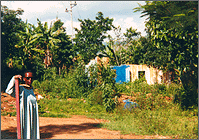As best as I have been able to piece together, this is what
happened. In the first days of April, my mother went for an
extended visit with my brother at the home he shared with his
Canadian wife and their two children. The home was located in
the Kimihurura neighborhood, not far from a base of the Presidential
Guard, the Rwandan military elite unit. Knowing the sensitive
position my brother and other moderate politicians were in,
the UN Mission in Rwanda had placed armed guards in front of
their homes. But, on the morning of April 7, as elements of
the Presidential Guard approached, the Ghanaian blue helmets
stationed at the house fled. Within the hour, the soldiers entered
the house and murdered everyone inside.
|

Louise
in front of ruins of childhood home near Kigali, Rwanda, 1995
Courtesy
Louise Mushikiwabo
|
Across town, Rwandan soldiers entered my sister’s house and ordered
her and her husband to go to the police station for questioning. Belgian
troops took her children to a near-by school called ETO for safekeeping,
where about 3,000 Tutsi had sought UN protection. My sister and her
husband were subsequently released, and went into hiding with some
Hutu neighbors for about a month. Their children, however, would not
be so lucky.
The
Belgian peacekeepers were ordered to evacuate Rwanda and, on April
11, they left the ETO school, leaving the 3,000 people inside to fend
for themselves against the Interahamwe. As soon as they left, the
killers entered the school and immediately targeted my nephew as "a
relative of the Inyenzi-in-Chief, Lando." With the killers in
hot pursuit, my nephew ran toward a nearby house for shelter, but
the owner slammed the gate closed and refused to let him in. The Interahamwe
hacked him to death on the spot. The 3,000 others who had been hiding
in the school fled about two kilometers up Nyanza Hill, but the Interahamwe
soldiers soon found and killed them, too, using machetes, sticks,
hand grenades, and guns.
Interahamwe soldiers also burst into the home of my other brother.
He begged them not to kill him with machetes, so they agreed to
shoot him, but only if he could pay for the bullets. He did not
have much cash on him, so he offered them his refrigerator, an iron,
and several other appliances. Satisfied, they led him outside and
shot him. His children, who recounted this story to me, managed
to escape and hid in near-by farms for several days before they
were rescued by the Rwandese Patriotic Front. His wife, however,
got separated from the children during the escape. Her remains were
found two years later in a near-by house that was burnt by the Interahamwe.
|


